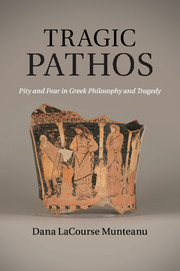Book contents
- Frontmatter
- Contents
- Preface and acknowledgments
- List of abbreviations
- Introduction
- Part i Theoretical views about pity and fear as aesthetic emotions
- Part ii Pity and fear within tragedies
- Chapter 5 An introduction
- Chapter 6 Aeschylus: Persians
- Chapter 7 Prometheus Bound
- Chapter 8 Sophocles: Ajax
- Chapter 9 Euripides: Orestes
- Appendix Catharsis and the emotions in the definition of tragedy in the Poetics
- Bibliography
- Index
Chapter 9 - Euripides: Orestes
Published online by Cambridge University Press: 05 December 2011
- Frontmatter
- Contents
- Preface and acknowledgments
- List of abbreviations
- Introduction
- Part i Theoretical views about pity and fear as aesthetic emotions
- Part ii Pity and fear within tragedies
- Chapter 5 An introduction
- Chapter 6 Aeschylus: Persians
- Chapter 7 Prometheus Bound
- Chapter 8 Sophocles: Ajax
- Chapter 9 Euripides: Orestes
- Appendix Catharsis and the emotions in the definition of tragedy in the Poetics
- Bibliography
- Index
Summary
Context and interpretations: a play with a rather “comic” end
More than any other tragedy analyzed so far, the Ajax evoked through plot and certain internal reactions a type of pity that comes closest to the Aristotelian theoretical description. The spectators were invited to feel pity through understanding the particular misfortune of Ajax in relation to human universals and, in this way, to experience anxiety about their own ephemeral condition. Conversely, as literary critics suggest at times, Euripides’ Orestes appears to have departed from Aristotle's recommendations. The author of a hypothesis to Orestes, commonly identified as Aristophanes of Byzantium (third century bce), notes that this drama has a rather “comic dénouement,” (κωμικωτέραν ἔχει τὴν καταστροφήν, 32) and most characters are “base” (φαῦλοι, 44), perhaps in the sense of comic. This is the term used by Aristotle to describe comic characters. The Poetics, for example, distinguishes between imitation of “noble” (σπουδαῖοι) and “base” (φαῦλοι) people (Po. 4.1448b24–7; 5.1449a32–4), the former being proper to tragedy, the latter to comedy. Tragic devices that do not stir pity and fear receive the labels of “not proper to tragedy” and “rather proper to comedy” in the Poetics and later in the scholia of Ajax. In the Poetics, double plots bring pleasure to the audience but a pleasure “not proper to tragedy but rather to comedy” (οὐχ αὕτη ἀπὸ τραγῳδίας ἡδονὴ ἀλλὰ μᾶλλον τῆς κωμῳδίας οἰκεία, Po. 13.1453a35–6), because the tragic proper pleasure comes from pity and fear (Po. 14.1453b12). A scholiast (Aj. 1123) noted that the arguments of the debate (involving Teucer, Menelaus, and Agamemnon) were not “proper to tragedy,” because the poet loosens the “tragic pathos.” Therefore, the writer of the hypothesis of the Euripidean play may well imply in his critique that, ultimately, the tragic action and the conduct of characters in the Orestes are not emotionally conducive. Modern scholars do not agree on whether Euripides’ rendition of the myth of Orestes would have compelled the spectator to respond with sympathy for the plight of the heroes.
- Type
- Chapter
- Information
- Tragic PathosPity and Fear in Greek Philosophy and Tragedy, pp. 208 - 237Publisher: Cambridge University PressPrint publication year: 2011

